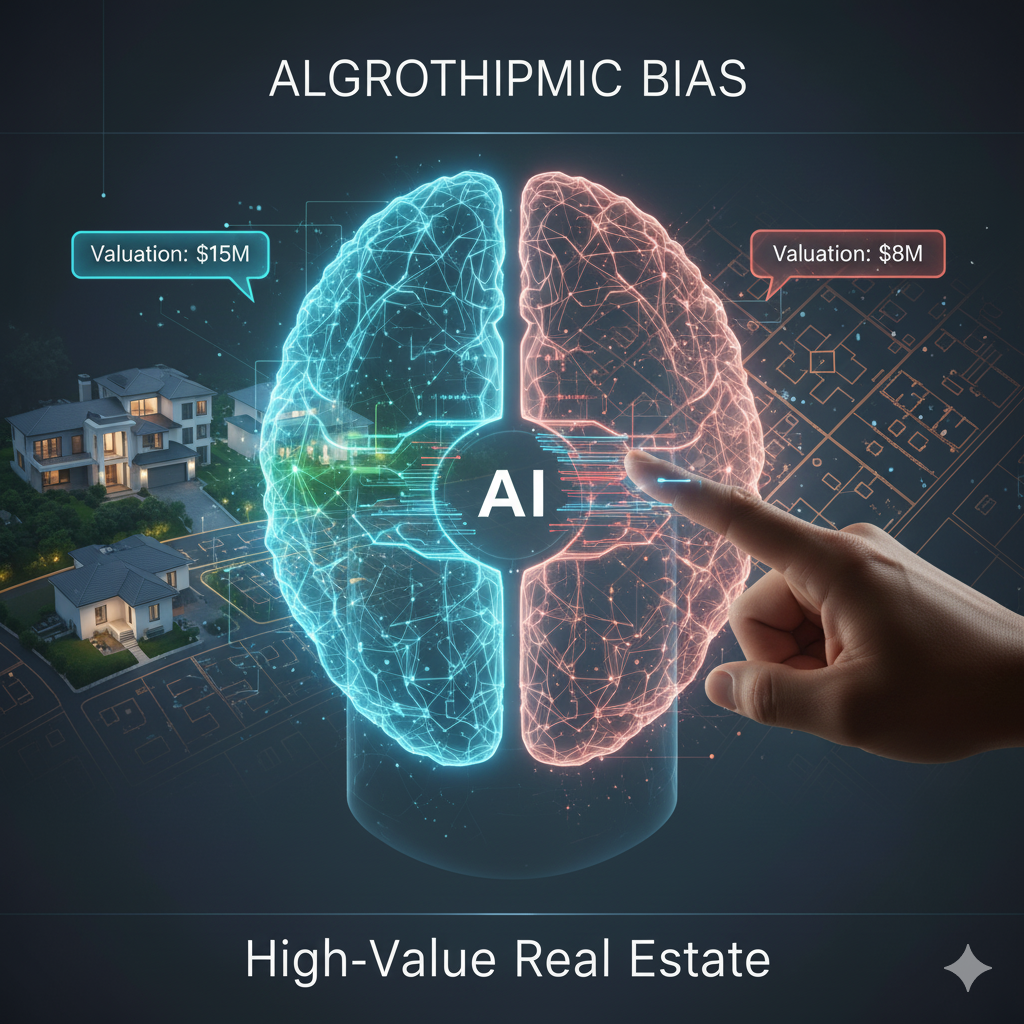The world of high-value real estate has always been defined by human expertise, discretion, and a deep, nuanced understanding of markets and people. Today, however, a new partner is quietly taking a seat at the table: Artificial Intelligence, or AI. The integration of AI into the buying, selling, and valuation of luxury properties promises unprecedented efficiency and insight, yet it simultaneously introduces profound ethical challenges that must be addressed with care and deliberation.
For those operating at the pinnacle of the property world—whether as advisors, investors, or high-net-worth (HNW) clients—understanding the ethical framework of AI is no longer optional. It is the new foundation of due diligence and trust. This detailed analysis explores the critical ethical implications of using sophisticated computational tools in transactions where the stakes are highest, focusing on bias, transparency, accountability, and the sacred trust of data privacy.
1. The Peril of Algorithmic Bias: Fairness in Valuation and Client Profiling
One of the most immediate and complex ethical dilemmas surrounding AI in real estate is the risk of algorithmic bias. AI systems, particularly those using machine learning, are only as impartial as the data they are trained on. If historical data reflects human biases—such as past discriminatory lending practices, disproportionate investment in certain neighborhoods, or subjective appraisals influenced by non-property factors—the AI will not merely replicate these biases; it will often amplify them.
The Luxury Valuation Problem
In the luxury market, accurate valuation is paramount. Automated Valuation Models (AVMs), which are heavily reliant on AI, can process massive amounts of data in minutes, offering a speed and scale a human appraiser cannot match. However, the qualitative factors that define luxury—bespoke finishes, architectural significance, a property’s unique provenance, or even a community’s socioeconomic profile—are highly nuanced.
If an AI is trained on a dataset where a property in a historically underserved neighborhood consistently sells for less than a functionally identical property in an affluent area, the AI will logically conclude that the first property is simply worth less. The algorithm fails to see the historical or systemic reasons for the price gap; it only sees the pattern. When this AI is applied to high-value assets, it risks:
- Perpetuating Inequities: Lowering valuations in areas based on non-property demographic factors, making it harder for those communities to build generational wealth.
- Creating False Narratives: Misrepresenting true market value by over-relying on readily available quantitative data (square footage, recent sales) while discounting the irreplaceable qualitative aspects that drive ultra-high-net-worth transactions.
The ethical responsibility here lies in a commitment to data hygiene and human oversight. We must audit the training data for embedded historical prejudice and ensure that human expert judgment remains the final, decisive layer in any significant property valuation. The goal of AI should be to reduce human inconsistency, not to eliminate human conscience.
2. The Black Box Dilemma: Transparency and Explainability
Trust is the currency of high-value real estate. A central pillar of trust is transparency: the client must understand the rationale behind a monumental investment decision. This is where the AI’s “black box” problem creates a significant ethical challenge.
A complex machine learning model can often deliver a highly accurate prediction—say, the optimal listing price for a $50 million estate—but the system cannot easily or clearly articulate why. It may weigh thousands of variables in a non-linear way, making the decision-making process opaque to the human user, the advisor, and, most importantly, the client.
Accountability in the Digital Age
When a client loses millions on an investment decision influenced by AI-driven due diligence or pricing, who is accountable? Is it the software vendor, the real estate brokerage that deployed the AI, or the individual broker who presented the data?
To maintain the high ethical standards the industry demands, every firm utilizing AI has a duty to pursue Explainable AI (XAI) solutions. This means developing tools that do not just provide an output, but also generate a clear, understandable narrative of the most influential factors driving that output.
Our ethical commitment to transparency requires:
- Mandatory Disclosure: Advising clients upfront on the extent to which AI was used in valuation, risk assessment, and recommendation, and securing their informed consent.
- Audit Trails: Implementing robust logging systems that track which data points and algorithmic logic informed a final decision, creating a clear chain of accountability.
- Human Interpreters: Ensuring that every piece of AI-generated insight is validated and interpreted by a seasoned professional—a trusted advisor who can translate complex data into actionable, human-centric advice.
The integration of AI must enhance accountability, not diffuse it. The professional, not the program, must always bear the ultimate responsibility for the advice given.
3. The Sanctity of Data Privacy: Protecting High-Net-Worth Individuals
High-value real estate transactions are inherently sensitive. They involve the disclosure of extremely private data: detailed personal financial information, global asset portfolios, confidential family structures, and often, highly specific lifestyle preferences (security needs, children’s schooling, health requirements).
The use of predictive AI in real estate requires massive datasets. As firms integrate these systems for personalized client profiling or targeted property sourcing, they are collecting and processing this sensitive information at an industrial scale. The risk of a data breach is magnified, and for HNW clients, the consequences—from financial fraud to reputational damage—are catastrophic.
Safeguarding Client Confidentiality
The ethical requirement for discretion and privacy in the luxury sector is non-negotiable. AI introduces two primary threats:
- Data Leakage via Third-Party Tools: Many professionals, in a rush for efficiency, may inadvertently input sensitive client data into unvetted, public-facing AI tools (known as “shadow AI“). This immediately violates confidentiality agreements, exposing proprietary information to third-party model developers with unknown security protocols.
- The Hyper-Profiling Risk: Advanced AI can aggregate disparate public and private data points to create an uncannily accurate, and potentially invasive, “hyper-profile” of a client. While this helps match them with the perfect property, it also creates a single, highly valuable target for cybercriminals and raises significant ethical questions about surveillance and manipulation.
The antidote lies in a disciplined, enterprise-level approach to data governance. Firms must invest in secured, enterprise-grade AI platforms and enforce strict internal policies that prohibit the use of unapproved tools for processing sensitive data. Furthermore, data collected for one purpose (e.g., a specific valuation) must be siloed and not automatically repurposed for another (e.g., targeted marketing) without explicit, renewed client consent. The ethical advisor treats client data not as a resource to exploit, but as a privileged and protected trust.
4. The Due Diligence Evolution: Ethics in Risk Assessment
One of the most valuable applications of AI is in due diligence. Algorithms can instantly scan thousands of legal documents, titles, regulatory filings, and environmental reports, flagging anomalies and risks with speed that crushes traditional methods. This efficiency is a massive advantage, but it carries an ethical weight.
The speed and volume of AI-powered due diligence can create an illusion of completeness. A quick, automated risk report might satisfy a baseline requirement, yet it may miss the subtle, contextual risks that only a seasoned human eye—one familiar with local politics, obscure zoning laws, or historical property disputes—can identify.
The ethical mandate here is one of completeness, not just speed. The due diligence team must use AI to manage the volume, but not to outsource critical thinking.
Advisory Principles for AI in Due Diligence:
- Augmentation, Not Replacement: The AI should be viewed as an assistant that flags potential issues, with the human expert responsible for the subsequent, in-depth investigation and interpretation.
- Contextual Validation: A human must cross-reference AI risk reports with local knowledge. For instance, an AI might flag a minor historical covenant, but only a local attorney knows whether that covenant is routinely enforced or entirely obsolete in that jurisdiction.
- Focus on Emerging Risks: AI must be deployed ethically to look beyond historical data and flag forward-looking risks, such as climate-related vulnerability (flood plain changes, fire risk models) which are often missed in traditional, backward-looking appraisal methods. This serves the client’s long-term interests and the greater societal good.
The Path Forward: A Framework for Responsible AI Adoption
The transformative power of AI in the real estate sector is undeniable, but its ethical integration demands a proactive, human-centered strategy. The luxury market, built on reputation and deep relationships, has the most to lose from a single, catastrophic algorithmic failure or a lapse in client trust.
Moving forward, the industry must commit to a new ethical framework:
- AI Governance and Audit: Every firm must establish a formal AI Governance Board—a multidisciplinary team of legal, technology, and real estate experts—to regularly audit the AI systems for bias, accuracy, and compliance with privacy and fair housing laws.
- Prioritizing XAI (Explainable AI): Demand and deploy systems that can generate clear, accessible reasoning alongside any critical output. If the algorithm cannot explain its logic in plain terms, it is too risky for a high-value transaction.
- Client-Centric Consent: Adopt a gold standard for data privacy, ensuring explicit, informed consent for the collection and processing of sensitive client data by AI. Transparency about data usage must be non-negotiable.
- Upholding the Fiduciary Duty: The human real estate professional retains the final fiduciary responsibility. AI is a tool to be managed, not a decision-maker to be blindly trusted. The human touch—empathy, negotiation, and ethical judgment—remains the highest value service.
The evolution of real estate is intertwined with the ethical evolution of technology. By addressing the challenges of bias, transparency, privacy, and accountability head-on, the industry can ensure that AI serves not just the bottom line, but the long-term trust and integrity that define the high-value market. The intelligent use of AI requires a human commitment to ethics, ensuring that innovation leads to a more equitable and trustworthy process for everyone involved.
Moses Oyong is a luxury real estate advisor with a passion for arts and culture, music, fashion, and all things luxurious. With a keen eye for beauty and attention to detail. I strive to help my clients find their dream homes that reflect their unique sense of style and taste whilst providing them with the right information to ease the stress of the decision-making process.




